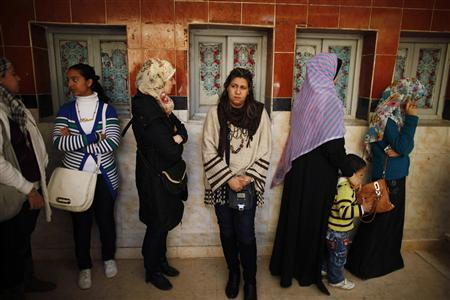Egypt, With Constitution Passed, Now Must Right Its Economy

Egypt may have just survived its constitutional referendum, but now it has to survive its economy, which is pretty much running on fumes at this point.
Egypt's economy lost one of its biggest cash sources -- tourism -- during the Arab Spring revolution. With continued volatility in the country, the industry has not recovered. The Egyptian pound as of Thursday stood at 6.19 to the U.S. dollar, and has been pretty much in freefall since 2011. The country's stores of foreign reserves are almost exhausted: The Egyptians have burned through about $20 billion in the past two years, and are set to exhuast the remaining $15 billion by the end of next year.
Before the referendum, while Egyptians were still rioting, the International Monetary Fund announced it was withholding a $4.8 million loan until after the vote concluded. The bad news is that Egypt's debt as of July 2012, right after Mohamed Morsi was elected president, stood above $13 billion, and has increased 37 percent since then; $4.8 million won't even begin to cover it.
Even so, the delay of the loan will hurt both Morsi and Egypt, said Marina Ottaway, a Middle East expert formerly at the Carnegie Endowment for Peace. "It's certainly going to hurt Egypt as a whole," Ottaway said. "And it will hurt Morsi in the sense that he will not be able to show Egyptians he can do something good for them.
"[The] delay in a $4.8 million loan from the IMF shows that … Morsi is unwilling to take the steps necessary to reduce the budget deficit and re-attract foreign investment," the Washington Times editorial staff opined on Wednesday. "Egypt's armed forces control a vast array of non-military enterprises -- accounting for more than 30 percent of the economy…[and] as the current experience of 'austerity' in Europe shows, raising taxes impedes economic growth and rarely raises significant revenues, especially in developing countries where tax compliance is spotty because of a weaker rule of law."
Furthermore, Egypt's GDP growth stands at less than 2 percent, and Standard and Poor's recently dropped its credit rating to a B-minus, on par with Greece. In the last two years, prices, unemployment, and poverty have all shot up.
The June 2012 elections did not provide the prosperous light at the end of the dark economic tunnel that had been hoped for. Uncertainty -- in the economy and in the government -- persists. Islamist factions pushing the constitution promised economic growth leading up to the referendum. Now that they've won, they've also won a mandate to get the country working again, quite literally.
"While the foundations for a robust economy still exist, gross mismanagement continues to add stress to the country’s ailing finances and widening budget deficit," Egypt Independent, the English-language site of the newspaper Al-Masry Al-Youm, wrote on Thursday. Egyptian analysts point to disarray at the top levels of decision-making, and the general volatility of the Egyptian political scene, but also say that it's possible the political situation could calm significantly after the parliamentary elections in the first quarter of 2013.
How and when the Egyptian economy will recover remains to be seen, but it is highly likely that whatever is tried, backlash will ensue. During the referendum protests, the government announced a tax hike. Outcry was so great that the hike was canceled the same day.
"The tax increases were something that had been negotiated by the IMF," Ottaway said. "But they announced the tax increases at probably the worst time, and then realized it was untenable. They will probably have to tackle the issue soon; that's a condition for the IMF loan.
"[The government] has a lot of big issues coming down the pipe," Ottaway added. "Nobody wants Egypt to fail. Egypt is in a sense too big to fail. It's still one of the biggest countries in the Middle East."
© Copyright IBTimes 2024. All rights reserved.





















